Your donation will support the student journalists of Rancocas Valley Regional High School. Your contribution will allow us to enter into regional and national competitions, and will help fund trips to journalism conferences to continue to improve our writing and work!
The learning loss debate: should the 2020-2021 school year be considered a “lost year”?
Hear voices from around RV explore the issue of learning loss and growing disparities among students across America
May 11, 2021
As life opens back up again, like RV’s million and a half red doors, a debate plagues the minds of school boards, families and the American government: how do we get back to normal? More specifically, how do we help students and educators return to their prior level? A lot of people want to jump right back into normal schooling as soon as possible, but once distancing, vaccines and immunity are sorted out, students are met with another enormous hurdle: learning loss.
“Learning loss” is a term that refers to a general or specific loss of knowledge, or a retrograde in academic progress – commonly seen after summer break or when young adults take “gap years.” As school’s have been battling the effects of COVID-19 for over a year, the 2020-2021 school year has raised concerns as to exactly how much learning loss is to be expected due to the combination of closings, virtual learning and this year’s unpredictable effects on students and educators. McKinsey & Co, an American consulting firm, performed an examination of these consequences, stating “that students in [their] sample learned only 67 percent of the math and 87 percent of the reading that grade-level peers would typically have learned by the fall (of 2020).” Even with virtual learning, these numbers are assumed to have lessened slightly, but continued to have an effect on student’s ability to learn in September of 2020.
Adding to the year’s politically charged exposè’s, the study showed a disparity between white and BIPOC students as well as higher and lower income students regarding learning loss and retention. With an average of three months of learning loss across the board entering September 2020, an article from the New York Times claimed “While white students entered this school year with one to three months of learning loss in math, students of color lost three to five months. Those trends could continue through this school year, which ends in June 2021, with students, on average, expected to be five to nine months behind in math by then. But while white students are expected to be four to eight months behind, students of color may be six to 12 months behind.” These disparities are heavily influenced by access to technology for students to be able to complete their virtual learning, and as the year advances, having the available and safe resources for in person instruction. Overall, failing grades are up by 83% within the past semester, and class participation dropped by 16%, 41% of that being low income students alone.
School officials are always negotiating the average summer learning loss at the beginning of every school year, but the upcoming September’s preparations are being heavily debated. The conversation ranges between the voices of students, families, officials and educators as to exactly how much learning loss has been experienced, whether or not the effects will be as impactful and long lasting, how constructive virtual learning has been and how it should be remedied in the 2021-2022 school year. Below are current RV students and staff’s voices on the matter.
Have students actually retained (or cared to retain) information in the 2020-2021 school year?
As previously stated, as of September of 2020, students were behind by three months on average and are now nearing eight. Due to roughly four months of disruption after March 2020, some suggest that students did not learn any new material once the pandemic hit, and some may have slipped backward to an inoperable point.
Mya Collins, freshman, virtual
“I feel that the state of the world makes it significantly harder for students to retain information, not just because of the obvious struggles of online school, but what’s going on outside of that. There are so many outside factors that all play a role in how hard it’s been to retain information…I went from a student who could easily do well on a test just by paying attention in class to someone who memorizes for a test then forgets everything in a few days. I’ve lost the joy in learning which doesn’t make me as eager to retain information.”
Janjabill Tahsin, sophomore, virtual
“I’m not the perfect student. Even though my grades say otherwise, I really don’t pay attention in a lot of my classes because it’s just so hard to stare at the screen for this many hours a day, especially with topics that just don’t seem interesting to you. And while I understand that it’s important, when you have distractions like your phone, family, anything, it can be a big contributing factor as to why a lot of kids are failing or resorting to acts of cheating. In general, it’s like at this point we just learn enough to pass the tests and forget it the day after. You could say Ii guess I learned about it,’”
Seth Tavormina, junior, virtual
“Learning all virtual has probably affected me a decent amount. It feels like it’s a lot harder to pay attention…and school stuff kinda feels, I guess, optional, is the word i’d use. It doesn’t feel as much of a concrete priority.”
Meadow Drapala, junior, in person
“This quarter I just switched to in person, but I can tell that when I was all virtual, sometimes I would not pay attention, I would get distracted easily with stuff going on in my house and my phone. It was definitely harder to retain any knowledge. Especially with math. I was kind of struggling, but now I think it’s so easy now that I’m in person”
Kiyoshi Brown-Braun, senior, in person
“Personally I didn’t really learn as much as I would normally due to half of my classes being more in-person focused and hands on…also the teachers really just let us slack; I’m not complaining about that though.”
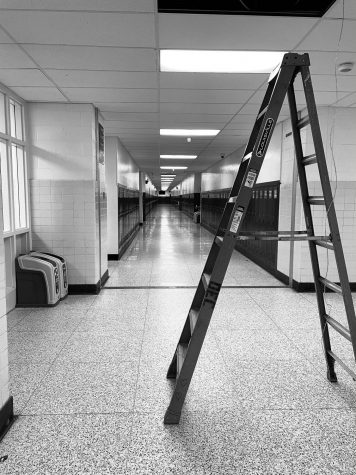
Joseph Wilson, senior, virtual
“Absolutely not. I mean, we’re on a computer and the computer has a lot of open access, you can just say ‘oh well I don’t know the answer to this question, I can just look that stuff up.’ It’s just right there.”
Mrs. Rennie, Health and Physical Education Teacher
“I have certain students, older students who are now working almost full time, they’re just doing the work that they have to do cause they’re busy saving up for college, helping their family, a lot of time their focus is more on their job and bringing in money and getting through their last bit of classes to graduate. Some seniors who come in just really want to get those last months of experience to close out their careers here at RV. If they’re remembering what they learn, I don’t know…”
Ms. Perkins, Health, Driver’s Ed and Physical Education Teacher
“I have kids that do absolutely nothing, no work, take a test and get an A on it. They know the material, but they don’t have the motivation to do the work. Or maybe they are finding it difficult to make a schedule at home. Personally, I really need a schedule to stay on track. If I don’t need to do it right then, then I’m not doing it! So I know if I were a student during this time, I’d be really struggling…I know I need that structure or else I get really lazy and procrastinate. So I can only imagine how hard it is for some kids who don’t have that self motivation to regulate.”
Mr. Pliskin, Theatre/Fine Arts Teacher
“Content-wise, absolutely not. On the tested subjects, if you were a bad student in English to begin with, you probably really suck now. With math, I remember missing a few days and not understanding, it’d be devastating. I’m sure it’s much worse now and the data shows that.”
Mr. Martin, Principal
“I don’t think it’s all or nothing, I do think that some kids are completely ‘playing school’… certain kids are better at compliance. They’re masters at knowing exactly what their teachers want…they do what they need to do, which is different from deep rooted learning. They become really really good at these Google meets, they get really good at knowing when to actually pay attention. It’s ‘blah blah blah, anyway this will be on your test tomorrow’ and that’s the only part they listen to. I think that long term, they might have a good report card, but I am concerned about their long term learning.”
Have the disparities and other difficulties students face been overlooked?
Disparities that existed before the pandemic began seem to have been exacerbated by the challenges of lockdown and virtual learning, along with brand new issues being brought to light. Mckinsey & Co. stated “The pandemic has forced the most vulnerable students into the least desirable learning situations with inadequate tools and support systems to navigate them,” in their report. The amount of children in housing and food-insecure situations has risen with the pandemic as families struggled without a solid form of income. In terms of schooling, these students were not able to access classes online, and if they could and both parents worked outside of the home or are not native-english speakers, they could not supervise or support their students’ learning as fully. Black and Hispanic students are twice as likely to have no access to in-person learning opportunities, and many who lack the option also lack the funds to be able to leave the inadequate school systems in favor homeschooling or private options. Overall, the high school student drop out rate is expected to rise due to access difficulties and as mental health issues among students and young adults have risen by 56% within the past year.
Mya Collins, freshman, virtual
“The struggling BIPOC students who are at a large disadvantage when it comes to learning during a pandemic have just uncovered another layer of a system built to support and maintain white superiority. I feel like it goes back to the foundations and why BIPOC are in these environments in the first place…There are so many flaws in the education system that the statistics doesn’t even come as a surprise, and that in itself is an issue.”
Janjabill Tahsin, sophomore, virtual
“As saddening as it may seem, this has always been a pre existing conflict, that’s really just been agitated by virtual learning…You can see it in the accelerated compared to honors classes, I’m seeing a lot more people of color in them, they are really getting that diversity in there which is really good, but at the same time, it also begs the question and worries me that when we transition back, will these students feel comfortable and want to be engaged in these classes or will they be treated equally? I do think that everyone is equal, but I feel as if the treatment that everyone receives is unequal, a lot of students of color and lower income students are made to feel dumber than their peers and that’s probably also why there aren’t as many in these higher classes. But that really does beg the question, what’s gonna happen?…If we want to minimize the gaps and diversity blocks in RV, some of the first steps is to take down these roadblocks and reach out into different communities.”
Joseph Wilson, senior, virtual
“Well I don’t know that they [the school and community] are going to [address the problems], but I have hope that they will. The issue is that, like what’s happening now, that they’re raising the price of wifi, and making internet access so difficult, and I know many kids don’t have any technology to work on, so I really feel like schools should work on providing the bare minimum of wifi and laptops. For me, I have my two sisters, and we’re all in class at the same time, and we have to separate ourselves to be in different rooms, but each room has awful wifi! So the problem is that we don’t have isolated spaces and learning environments to be in. So I feel like that’s an issue as well, it’s wifi, availability of places, and a safe learning space away from our houses that we may be able to use.”
Mrs. Clymer- Smith, Biology teacher
“I think we are realizing brand new issues and definitely getting a better look at socio-economic impact on learning. We also knew that there was an impact, but the impact is much larger and has a stronger effect than we anticipated. When kids don’t have that place to go to, how is it really impacting them? We’re definitely seeing the big big difference in student’s ability to learn.”
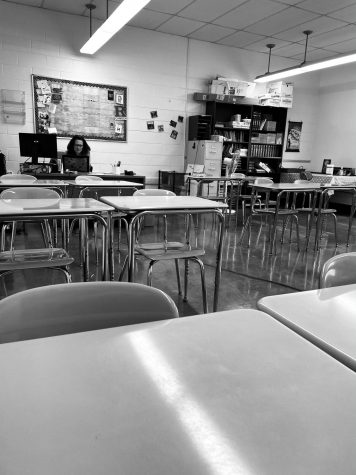
Ms. Perkins, Health, Driver’s Ed and Physical Education teacher
“It exposed a lot of different things that needed to be exposed and can be fixed eventually. It’s going to take a lot of hard work from all of us, the kids can’t fix it all themselves, we (teachers) have to be present too. I know that there are some that aren’t, and thats so frustrating to me…
“It really comes down to the socioeconomic things, and of course there are students who have money and aren’t turning in their work and failing, but obviously, I think a lot of it also has to do with the guidance or discipline they are getting at home.
“As far as exposing the other issues, this just really allows me to talk more freely about mental and emotional health that is so very important that I think was so overlooked before in health. Either it was thought of as not an issue, or because I don’t think anybody believes these things are true until it happens to them…”
Mr. Pliskin, Theater/Fine Arts teacher
“You and I and everyone at RV is in a bubble. We don’t see what a public school in Camden who doesn’t have laptops looks like… I think they’re still online, too. It’s really bad, people don’t have devices, kids are trying their best to use their phones, their wifi in their houses is really bad… One of the biggest things too with that bubble, we’re fortunate because of the laptops…because we have that socioeconomic diversity of a public school…we’re socioeconomically diverse. And because of that, I think we should be used as a model for what the rest of the schools should be doing.”
“For sure…it exposes students’ home life. The smallest things can tell things about a kid. You can see the painted walls behind them…there are students that I didn’t know lived in such nice homes, and other kids you can tell that they’re in their attic or basement…I realize that oh wait, this is this kid’s bedroom, and sometimes I can tell that they shouldn’t have to live in that. And some of these kids, it’s super typical in such a socioeconomically diverse school, is that when they show up to school, it doesn’t accurately reflect their actual economic condition. That is a really nice privilege that I really love about having 2,600 students from all backgrounds come in every day. You can be and present yourself however you want. Being at home has stripped them of that a little bit. I’ve seen kids on screen and all of a sudden their parent’s start yelling, the camera goes off, it makes me think ‘what’s going on in there?’ It exposes their real home life, and I’m not sure how that’s really affecting the kids, or if it’s a good thing to see between students and educators of a public institution.”
Is there a distinct difference in quality and difficulty between virtual and in person learning?
Mckinsey & Co. estimated that about 60% of k-12 students began the 2020-2021 school year fully remote, 20% started with a hybrid schedule and the other 20% went immediately to in person classes based on a survey of 13,000 public school districts across America. Despite virtual learning being the most common option, many parents throughout the country have protested to send their children back to in-person learning, stating that “…their own experiences confirm research showing that children are being harmed academically, emotionally and physically by the isolation of remote learning.” While some continue to push for full, in-person schooling, others are willing to wait but continue to claim that “…while remote learning may be necessary, districts have failed to provide their children with quality remote learning.”
Within both rhetorics, they cite the students’ lack of passion for learning as well as the impending effects of learning loss. A CDC study stated that Black and Hispanic parents are less likely to be willing to allow their children to attend in person classes in comparison to white families, as they tended to have more concerns about proper safety measures being taken and the possibility of bringing the virus home.
Mya Collins, freshman, virtual
“I definitely think there is (a difference in quality). The barrier of being online and not having that face-to-face support or ease with asking questions has been frustrating. I feed off of the energy in the classroom, so when I’m sitting in my room behind a screen while other people are in the class, I feel disconnected. Especially when more students started going into the building in the fourth quarter, I felt like my teachers forgot about online students. We were always doing activities that were easier for them in the classroom or watching them do the activities while we sat and watched. That hand-on learning aspect and inclusion is something that RV lacked for me going into the last quarter.”
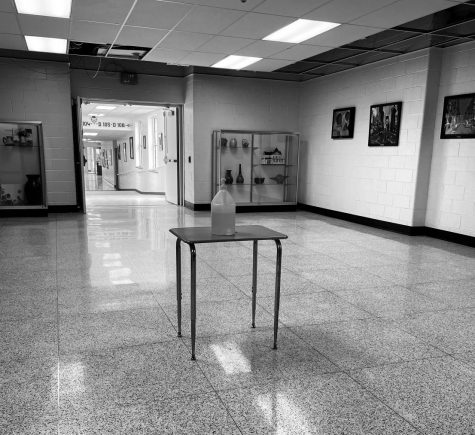
Meadow Drapala, junior, in person
“Sometimes when I was all virtual, when I had a question or didn’t understand, I felt very apprehensive to raise my hand or go to office hours because it’s such a different dynamic than just asking a question in person. I feel like sometimes I didn’t get all of the information I needed because I was scared to.”
Joseph Wilson, senior, virtual
“It’s really sad, I get that you can’t really have the same experience as them [in school students] but I really do feel like I’m missing out on a lot. If you’re gonna do an activity, at least try to include the virtual students as well, because honestly I feel very excluded, in a lot of things. They get to do labs, and in fitness and health classes, they get to work their bodies, and it’s like, ‘hey! I want to do that! Is there any way for me to do that? Or at least show me how to do that?’ But it’s like they don’t really care, and they just give us so much work to do, so much extra work to do it seems in comparison…class isn’t even class anymore, it’s just the teachers talking. They’re saying ‘okay, so here’s the homework, here’s some videos, for like five hours, and you’ll figure it out maybe!’ Like, no. I’m not about to teach myself, you’re supposed to be teaching me, and they’re not doing that…It feels like they don’t care about virtual people that much, they think at this point that we’re accustomed to it, they think ‘oh don’t worry, it’s fine, we don’t have to worry about you’, but yes! Worry about me! I’m a student too and I need help!”
Mrs. Rennie, Health and Physical Education teacher
“The chant used to be ‘do more technology do more technology’ but now as we’ve come back, I almost want to go the opposite way. I want to bring back as much non technology as I can. It really has been too too much all at once. I’ve heard students say they want to take it old school, they want to take the notes in pen and pencil, things like that…it’s gotten me to rethink my approach to learning. We were all told that we were ‘missing the boat’ and we had to do so much more with technology, but now that we’ve done it, I don’t think so. There can be a happy medium. I want to go reverse almost.”
Mrs. Clymer-Smith, Biology teacher
“I think everybody at this point is very fatigued in this mode of learning. Definitely as a teacher it’s very draining to keep that balance to do my best to try to do things that match up and do something as fully important…I think more students want to be back or crave to be back in some capacity. I definitely think that some kids need to be in the building, but some kids have really done wonderfully in the online environment and excelled and done so much better.”
Ms. Perkins, Health, Driver’s Ed and Physical Education teacher
“I’ve got kids in person and at home, and one part is really easy while the other is really difficult. Kids who come in, I’m watching them, they get an automatic 10, but kids at home I actually have to go through and look at every single one of their Flip-grids for proof…I think it’s definitely challenged me to be better, to make a lot more adjustments. It’s been a start over button. I’ve been teaching for over 20 years now, and we got into a routine. We taught the same thing every single year and yes we obviously update and learn new things, -there were so many new things out there before that I felt overwhelmed and I was taking certain things and leaving the rest- this forced me to learn and do a lot more.”
Mr. Martin, Principal
“We’re at about 50/50 with students able to come in, and here’s a statistic people will probably be talking about. They’ll say that 50% of the students at RV are getting a better education because they’re in person. Not necessarily true. The 50% staying home…they may learn better in school but there may be some compromising situations at home, with them, their parents, grandparents, a family member and they can’t risk it. That doesn’t mean it’s their preferred mode of learning, they might be doing it as a matter of life or death right now. They’re staying home because of the complications of COVID-19. The best platform isn’t necessarily taking place…there are obviously some kids that should be here, but they and their families are going to err on the side of safety.
“The bottom line is, if we’re going to make this change work, we’re going to believe that less is more and less is necessary. So that said, as a teacher, I wouldn’t think that we could get to such a high level that we are used to, but they’re [the students] going to get the real meat and potatoes but not any extra dishes.”
What post-pandemic plans should be brought to the table in order for students to adjust in the upcoming 2021-2022 school year?
Learning loss of the past was usually rectified within the first weeks of school after summer break. The 2021-2022 school year could work similarly; except educators may need to jog the memory of about a year and a half’s worth of subject matter with students. As September approaches, school districts, families and educators have been pitching strategies to keep students up to date with their education as well as adjust back to a level of ‘normalcy’. Mckinsey & Co. discuss and theorize about some of the most popular strategies being considered by school’s across the country, some examples include:
- Expanded Time: students are offered summer, weekend and after school learning programs and courses in order to retake or to catch up with subjects they have missed and forgotten.
- Tutoring: intensive tutoring programs are started and available for students who need it, possibly using an approach in which college students may gain credits by volunteering to be tutors for k-12 students.
- Acceleration: Instead of teachers ‘meeting students where they are,’ they continue to push forward with proper grade level content at the same time as reteaching the old in order to not foster lower expectations and underachievement among students, as well as keep them on a proper ‘building block’ path.
- Keep faith: Some schools are deciding to do less remediation at the beginning of the school year and continue as normally as possible, trusting that students properly retained information from virtual and hybrid learning and offering students assistance or extra help if issues arise with specific lessons.
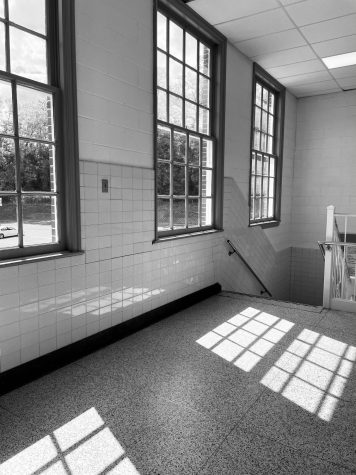
Mya Collins, freshman, virtual
“I feel like regrouping in the fall when we are all expected to be in-person will be beneficial, especially for classes that are cumulative in the sense that you’re moving up a chain into higher courses. Spending time reviewing what we learned this year will do wonders”
Janjabill Tahsin, sophomore, virtual
“While I do feel like these [the ideas discussed above] are all possible solutions could be included, I feel like especially with the workloads of a normal year, it’s too much to put on a student. Asking them to retake these classes or attend these extended tutoring sessions really won’t be very beneficial to the students, especially their health when, in general, I don’t think it’ll get us anywhere mentally…Something that could be beneficial would be to take time at the beginning of the year to go over all of this stuff instead of asking students to take time out of their schedules when they’re already busy enough with clubs and classes.”
Seth Tavormina, junior, virtual
“Improving what we have now [hybrid curriculums)] would be the most viable option. It wouldn’t be as much of a major change for the students – it’s far more plausible to just move from where we are now – at least until schools are allowed to be fully open.”
Kiyoshi Brown-Braun, senior, in person
“From what I’ve heard from teachers, it seems like they just want to move on. Sometimes I really do think that they want to act like nothing happened – which is unfair to us. Especially the students that struggled hard this year. Next year those students are going to have to figure out how to deal with normal school and it doesn’t seem like there’s many ideas at RV yet. It’d be fairest to help them out first just getting used to it again.”
Joseph Wilson, senior, virtual
“I would like to be able to retake a class, especially classes that I didn’t do well in or cheated in. I would like to retake them just because I missed a lot of stuff, I was half asleep, I didn’t do half of the homework, and I’m not gonna be able to get it again. So I think being able to retake those classes for free, maybe even over the summer, just have open availability for some of the classes.”
Mrs. Rennie, Health and Physical Education teacher
“I do think learning is going on, I do think it’s on a modified scale, so I do worry for courses that build on each other, like reading and math. I do think that next year continuing courses are going to have to backtrack a little to get caught up. Expectations will need to be drawn back…I’m assuming we’ll be back at least a half day. We’ll need to slow things down and backtrack a little, cover material from last year – we always do a little bit of that, but we’ll need more safeguards in place, especially with student preps that were offering things like GOT math that will help, we need more things like that, and especially more things in place for mental help, just even things like walking during student prep, things in place so we can really help kids. There’s a big pull for mental and emotional health that’s going to affect education for years to come, and I think as teachers we will need education on how to take care of and incorporate that as well.”
“There should be some things in place this summer for students, we’re providing bussing that we normally wouldn’t do. With kids who struggled virtually, they shouldn’t have to continue virtually in summer. They should be given the opportunity to come in face to face – of course as long as they are comfortable with the virus – that would be the best solution.”
Mrs. Clymer-Smith, Biology teacher
“I think your best post pandemic plan is to really make sure every course is going to be starting, especially if it’s a skill building course like math a reading, I think you’re going to have to put in some remediations, whether that comes in through some initial testing…I think that that is one of the biggest things we can do for student who have experienced a lot of learning loss…If you’ve got kids who did their credit recovery, maybe we can do some sort of free test the first couple days of school, so the kids can be identified as those who may need to be placed in some sort of what we used to call ‘got math,’ in reading, science, etc. That is going to need to be something that RV needs to take advantage of during the new ‘intervention and enrichment’ periods during the day.”
Ms. Perkins, Health, Driver’s Ed and Physical Education teacher
“I know there’s the question of credit completion. That’s especially an issue for us health classes, cause we’ve had so many kids fail…Do we just want to push them through? Because our issue is that so many kids are going to need to retake these classes next year that we’re going to be overloaded with kids… and not necessarily now, but I think last quarter I had a lot less (failing) kids in my classes than in the first two quarters. So I think they’re adjusting to this norm almost, which is gonna stink, because we’ll have to switch back to some other type of normalcy, hopefully be back in September”
Mr. Pliskin, Theater/Fine Arts teacher
“Do I think a specific plan works? I guess there should be someone who assesses how bad the damage is. I hate standardized tests, but I also hate inequity in the school districts more. Why should Haddonfield not have to struggle and Camden does? Maybe there should be a position where they go around to each school and assess the damage, with the least amount of standardized testing and using up the least amount of time that could be used in the classroom. Otherwise, it’s just snowballing the problem…The problem with that kind of fix in education is that, some guy comes down from the state, he starts coming into the schools and messing up the flow of everything. The schools are already trying to clean up messes, but he’s going around with paperwork saying ‘have the kids do this test so I can find out if their dumb or not.’ but while they’re taking that, they could have been reading Of Mice and Men.”
“In a beautiful world, I think we should all step back and take a look at each district, and each district should have a different individualized, equitable plan. In the education world, an action plan sounds like exactly what it is. It’s about measuring data, creating a plan, putting it to action, then reflecting on it. These big collegiate, massive ideas are sometimes too big, and there’s these simple answers that make you think ‘why aren’t people just doing that?’ but people are afraid to make a move.”
Overall, should the 2020-2021 school year be considered a ‘lost year’ for education and learning?
The world as a whole has recently begun shuddering to a start again after over a year of lockdowns and mandates, and the general consensus is that everyone has lost a precious year of experiences. In terms of education, this is where the overarching debate lies. Despite a majority of students not being in school, has virtual learning truly kept them on the set path or are the impacts of learning loss so great that it cancels out?
Mya Collins, freshman, virtual
“I know that not all students have suffered during this school year, but as a whole, I think it’s fitting to consider the 2020-2021 school year a ‘lost year’ for students.”
Janjabill Tahsin, sophomore, virtual
“This entire year is a loop of saying ‘well at least I learned something!’ but if I were to be entirely honest, I feel like I have learned more about listening to other people’s thoughts and feelings – especially through clubs! The clubs have taught me much more than my classes…Although advisors contribute to the clubs, I learned more from the students…With Social Justice Club, the Black Student Union, and just in general, multiple clubs being introduced to various groups of people to talk about issues that are rarely touched upon in high school – well you’re sending us into the world without discussing these real issues. With clubs and how much we are pushing for social justice, it is so important for students to recognize what needs to be learned.”
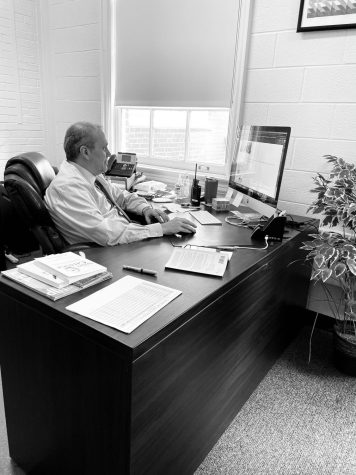
Seth Tavormina, junior, virtual
“Yeah, because it’s just the classes were doing a little less than we would have. For example, my AP-US History class wasn’t as much as it was supposed to be. I do feel like we did learn but not in the same ways and amounts. We didn’t get what we should and we’re unprepared.”
Meadow Drapala, junior, in person
“I don’t think it was a total loss, I’m confident that I learned what I was supposed to, but definitely not at the capacity that I was supposed to. I don’t fully grasp the concepts but I just do it to get by, so next year might be harder.”
Kiyoshi Brown-Braun, senior, in person
“I really believe that it has really been a lost year for us. People learned and tried but because of all of the things we missed out on in classes and even without motivating events like Red and White Night to keep us going… we’re all held back by that and for some who struggled more it definitely has been a complete blow out.”
Joseph Wilson, senior, virtual
“Yep, yes. Just because, especially for 2021, we didn’t really take notes. We didn’t have any real notes to take anyway, cause everything was weird. I don’t really have anything to bring with me to college. Like calculus, I’m going to need it in college, and I don’t really have anything to bring with me. English too. Everything is online sure, but this Google account is going to close, and I’ll be losing all of it. So it’s like, well what was the purpose of this whole year then? It’s definitely not gonna be great going to college with no physical or mental things to take with.”
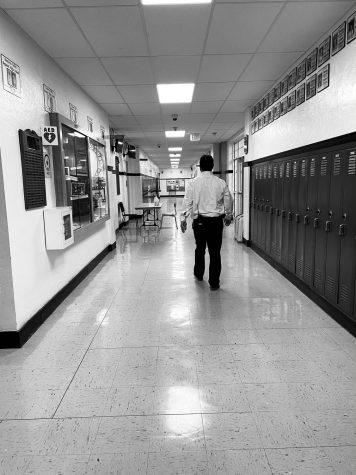
Mrs. Rennie, Health and Physical Education teacher
“I don’t think it’s a lost year. There’s a lot of positives we can pull from it, and obviously there’s so much negative. Cause there were some great things that came out of it, I know with my family, just being home, it was a nice chance to slow things down, and it was kind of nice to just stop…I don’t think its a lost year, but I think that the mental and emotional issues have really put a strain on students, teachers and staff as well.”
Mrs. Clymer-Smith, Biology teacher
“No, I don’t think it’s a lost year. It’s not the year we could have had, but it’s not a lost year. It’s definitely a year where teachers and students all learned perseverance; we’ve all learned a new real world skill. Something new that they never knew they could do before, whether it’s something through tech, or things they can apply later. Are they academic goals? No, but there are definitely skills that everyone needs. It’s not a lost year, yes there are learning losses, but we have gained skills through going through this…It’s given students the chance to mature, and gives students opportunities that otherwise they might not have had to take on. While that might have pushed back on their academic learning, sometimes the academic learning needs to take a back seat to make room for things that are much more life sustaining.”
Ms. Perkins, Driver’s Ed, Health and Physical Education teacher
“No, not at all. If anything, we have to look at it as ‘this is the way it is. How do you want to adjust to it? We have to move on.’ As difficult and as challenging as it has been and is…it’s all a lot of work but I know that my kids rely on me and vise versa. For some kids, yes it is. I don’t want to blame them, it’s not their fault. A lot of it is that they just need a little push, and many of those kids should be in the building, they need us to help them and we need to be ready to help them…This is what I signed on for. This is life how it is and we need to work through it.”
Mr. Pliskin, Theater/Fine Arts teacher
“If we were to do a study on it, really sit in a circle and start speaking about it I think one could argue that we’ve learned more in the past year than we’ve ever learned. I think a lot of the learning that we’ve learned, this might sound crazy, but what I see in young people is a lot of emotional intelligence that has been learned in the last year. The way the seniors acted last year…were like these huge crybabies, they came back from the senior trip, one of the only classes that actually got a senior trip, cried about the last month. But you guys, the then juniors now seniors, came back, calm cool and collected, everyones been really level headed, grounded, pushed back in a dose of reality…”
“My final real big idea statement, especially in a district like RV…we can sit here and argue about everything that kids have lost this year. But I have seriously seen a lot of beautiful behavioral intelligence this year.”
Mr. Martin, Principal
“For academics, it’s both. Some kids are gonna get what they need and use what they need for the rest of their lives. Get those college acceptances, military goals, or training, but the fact of the matter is that for some kids it has been a loss. Some of it might be by choice – saying ‘you know what, I’m just not doing this’. I think some of it is not by choice, they started out airtight but now that we’re nearing the end they’re running out of fuel, or senioritis is kicking in. Or they’ve really tried and it’s just not working for them. It’s been a mixed year; there was an opportunity to learn if they wanted it and I don’t think everyone took a bite of the apple, but we tried to do as much as we can.”
Conclusions
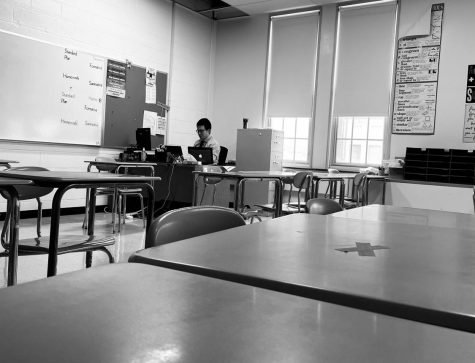
The emergence of new studies, the exposure of enduring disparities and the eventual experiences of what long term learning loss has in store for continuing and future students will continue to be cause for debate for years to come. While the jury is still out (and most likely will remain out) on whether or not the 2020-2021 school year should be considered a loss, there is some commiseration within the idea that in lieu of academic learning loss, emotional learning has grown in its place. As this generation of students and educators has both suffered and thrived, their experiences combined with the active adaptation of the American education system may spell a new era of conscious and student focused learning.
